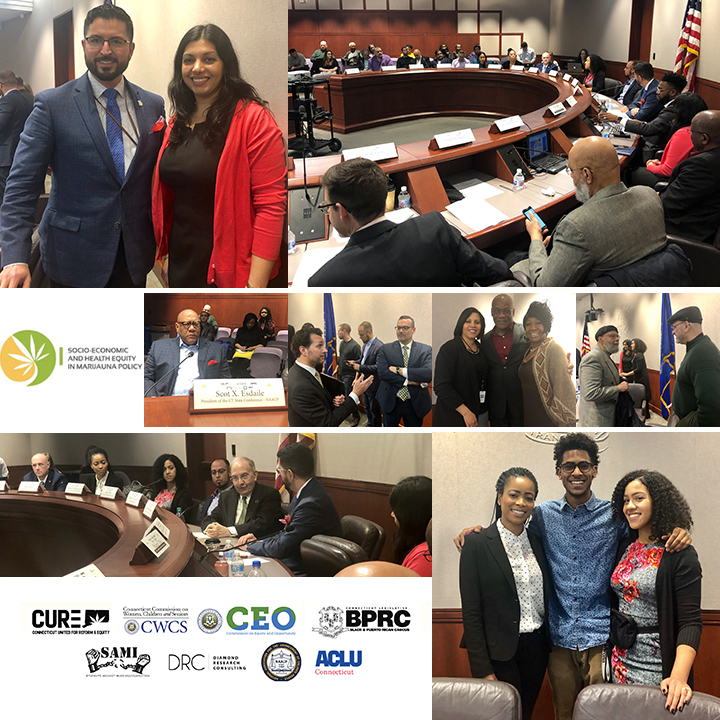Top 10 Equity Must-Haves in Any Legalization Bill

Originally shared with the Connecticut General Assembly Commission on Equity and Opportunity.
As promised, I am sharing my top ten equity must-haves for any state cannabis legalization bill. I rewrite these every time I give a speech in another state, because every day I learn more and they evolve.
Disclaimer: These are my subjective opinions based on experience as both an activist and regulator, offered in good faith for those trying to keep improving on our current progress. As more states learn more lessons and share them, we will all keep refining our knowledge.
-
Homegrow. Allow consumers to grow a limited number of their own plants at home (in MA, it’s 6 per adult with max of 12 per residence, see law for details) and gift a limited amount to other adults (in MA, it’s one ounce). This serves as a check on monopolies, delays, and more.
-
Automatic expungement for cannabis convictions, in the same law at the same time as legalization. Period.
- Ensure as a non-negotiable, never-expiring statutory requirement that people from disproportionately harmed communities are represented at the very top of the regulating agency. (Yes, there are plenty who are qualified.)
-
Ensure that the regulating agency is diverse, independent, subject to full transparency, and appointed by different people. This is something I’m incredibly proud of in MA and I recommend adopting it. Brand new agencies take time/resources to start up, but it’s worth it.
-
Dedicate tax revenue to be reinvested into disproportionately harmed communities. Give it teeth; do not allow that revenue to be “subject to appropriation” and do not require bureaucratic application processes that only privileged communities will be able to tap into. Sidenote: the Minority Cannabis Business Association model state bill, which I worked on before becoming a commissioner, creates an Office of Justice Reinvestment to fairly distribute such revenue.
-
Separate from that reinvestment, invest a specific percentage of tax revenue into technical assistance, hiring programs and interest-free loans for disproportionately affected communities with a funding mechanism for initial programming and outreach as soon as the law passes. It is very important that you specify the agency(ies) in charge with specified deadlines and consequences for missing the deadlines. I think every existing equity program thus far, including the one I designed, underestimated the need for IMMEDIATE outreach and education.
-
Require state regulators and localities to ensure diversity in the industry at ownership and employee levels, and to enforce limits, with goals, measurement, and accountability for the regulators (it may be best for them to design their own goals rather than specifying them).
-
Institute a statutory requirement that tax revenue only flows to municipalities that have honored these mandates. Leave it up to the municipalities to figure out how to make their local laws and processes inclusive to disproportionately harmed communities BEFORE receiving any local taxes. Sidenote: my recommendation to anyone seeking an equitable cannabis program would be to not compromise an inch on this one. It could easily undermine all the rest. There are good and bad local examples throughout MA and CA.
-
Require every business to contribute to these goals in addition to (BUT NOT INSTEAD OF) the government’s role. One option is to require diversity plans and positive impact plans as requirements for licensure and renewal, as in MA, but there are many ways to accomplish this.
- Lastly, require the regulating agency to collect data on each of these items, report the data regularly, and take remedial measures when the data is not satisfactory. Give the regulating agency broad flexibility and authority to accomplish this.
Hope you found this helpful. Feel free to use and share with or without attribution. If you’re standing up for equity before the law passes, team up with everyone who doesn’t want an industry controlled by a handful of corporations. Don’t get boxed into outdated pro vs. anti-pot.
By the way if anyone brings up “constitutional concerns” over benefits for disproportionately harmed communities, they’re probably using that an excuse to not have to say they don’t like equity. Ask for the specific legal concerns in writing and you likely won’t hear back.
Social justice advocates being asked to support legalization bills, being promised that equity will come later: you know it won’t. Don’t underestimate the power you have. After the law passes you’ll never have this much power again. Use it. Future generations are counting on you.